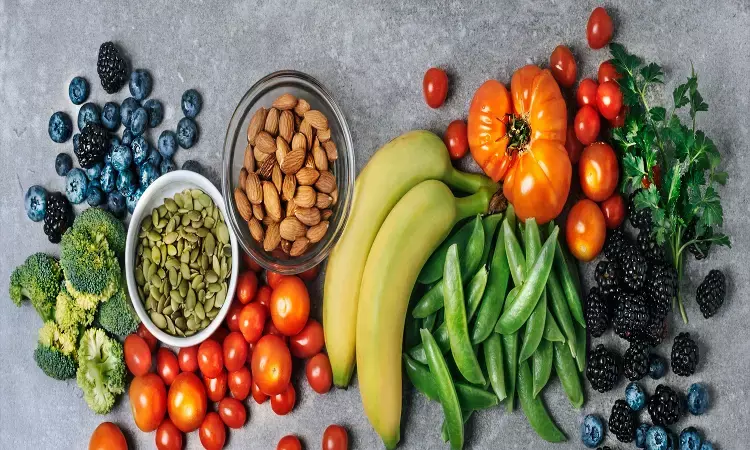- Home
- Medical news & Guidelines
- Anesthesiology
- Cardiology and CTVS
- Critical Care
- Dentistry
- Dermatology
- Diabetes and Endocrinology
- ENT
- Gastroenterology
- Medicine
- Nephrology
- Neurology
- Obstretics-Gynaecology
- Oncology
- Ophthalmology
- Orthopaedics
- Pediatrics-Neonatology
- Psychiatry
- Pulmonology
- Radiology
- Surgery
- Urology
- Laboratory Medicine
- Diet
- Nursing
- Paramedical
- Physiotherapy
- Health news
- Fact Check
- Bone Health Fact Check
- Brain Health Fact Check
- Cancer Related Fact Check
- Child Care Fact Check
- Dental and oral health fact check
- Diabetes and metabolic health fact check
- Diet and Nutrition Fact Check
- Eye and ENT Care Fact Check
- Fitness fact check
- Gut health fact check
- Heart health fact check
- Kidney health fact check
- Medical education fact check
- Men's health fact check
- Respiratory fact check
- Skin and hair care fact check
- Vaccine and Immunization fact check
- Women's health fact check
- AYUSH
- State News
- Andaman and Nicobar Islands
- Andhra Pradesh
- Arunachal Pradesh
- Assam
- Bihar
- Chandigarh
- Chattisgarh
- Dadra and Nagar Haveli
- Daman and Diu
- Delhi
- Goa
- Gujarat
- Haryana
- Himachal Pradesh
- Jammu & Kashmir
- Jharkhand
- Karnataka
- Kerala
- Ladakh
- Lakshadweep
- Madhya Pradesh
- Maharashtra
- Manipur
- Meghalaya
- Mizoram
- Nagaland
- Odisha
- Puducherry
- Punjab
- Rajasthan
- Sikkim
- Tamil Nadu
- Telangana
- Tripura
- Uttar Pradesh
- Uttrakhand
- West Bengal
- Medical Education
- Industry
Changing your diet could add up to a decade to life expectancy, study finds

A young adult in the U.S. could add more than a decade to their life expectancy by changing their diet from a typical Western diet to an optimized diet that includes more legumes, whole grains and nuts, and less red and processed meat, according to a new study publishing February 8th in PLOS Medicine by Lars Fadnes of the University of Bergen, Norway, and colleagues. For older people, the anticipated gains to life expectancy from such dietary changes would be smaller but still substantial.
Food is fundamental for health and, globally, dietary risk factors are estimated to lead to 11 million deaths and 255 million disability-adjusted life-years annually. In the new study, researchers used existing meta-analyses and data from the Global Burden of Diseases study to build a model that enables the instant estimation of the effect on life expectancy (LE) of a range of dietary changes. The model is also now available as a publicly available online tool called the Food4HealthyLife calculator (https://food4healthylife.org/).
For young adults in the United States, the model estimates that a sustained change from a typical Western diet to the optimal diet beginning at age 20 would increase LE by more than a decade for women (10.7 [uncertainty interval 5.9-14.1] years) and men (13.0 [6.9-17.3] years). The largest gains in years of LE would be made by eating more legumes (females: 2.2 [1.0-3.4]; males: 2.5 [1.1-3.9]), more whole grains (females: 2.0 [0.7-3.3]; males: 2.3 [0.8-3.8]), and more nuts (females: 1.7 [0.8-2.7]; males: 2.0 [1.0-3.0]), less red meat (females: 1.6 [0.7-2.5]; males: 1.9 [0.8-3.0]) and less processed meat (females: 1.6 [0.7-2.5]; males: 1.9 [0.8-3.0]). Changing from a typical diet to the optimized diet at age 60 years could still increase LE by 8.0 (4.8-11.2) years for women and 8.8 (5.2-12.5) years for men, and 80-year-olds could gain 3.4 years (females: 2.1-4.7 and males: 2.1-4.8) from such dietary changes.
"Understanding the relative health potential of different food groups could enable people to make feasible and significant health gains," the authors say. "The Food4HealthyLife calculator could be a useful tool for clinicians, policy makers, and lay-people to understand the health impact of dietary choices."
Fadnes adds, "Research until now have shown health benefits associated with separate food group or specific diet patterns but given limited information on the health impact of other diet changes. Our modeling methodology has bridged this gap."
https://journals.plos.org/plosmedicine/article?id=10.1371/journal.pmed.1003889
Hina Zahid Joined Medical Dialogue in 2017 with a passion to work as a Reporter. She coordinates with various national and international journals and association and covers all the stories related to Medical guidelines, Medical Journals, rare medical surgeries as well as all the updates in the medical field. Email: editorial@medicaldialogues.in. Contact no. 011-43720751
Dr Kamal Kant Kohli-MBBS, DTCD- a chest specialist with more than 30 years of practice and a flair for writing clinical articles, Dr Kamal Kant Kohli joined Medical Dialogues as a Chief Editor of Medical News. Besides writing articles, as an editor, he proofreads and verifies all the medical content published on Medical Dialogues including those coming from journals, studies,medical conferences,guidelines etc. Email: drkohli@medicaldialogues.in. Contact no. 011-43720751


